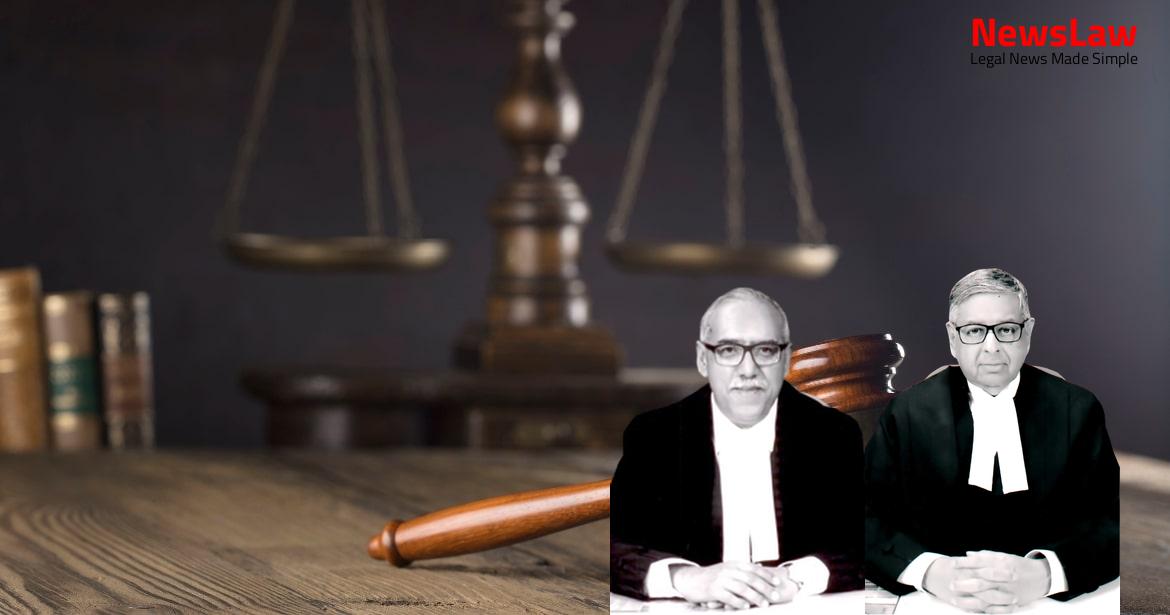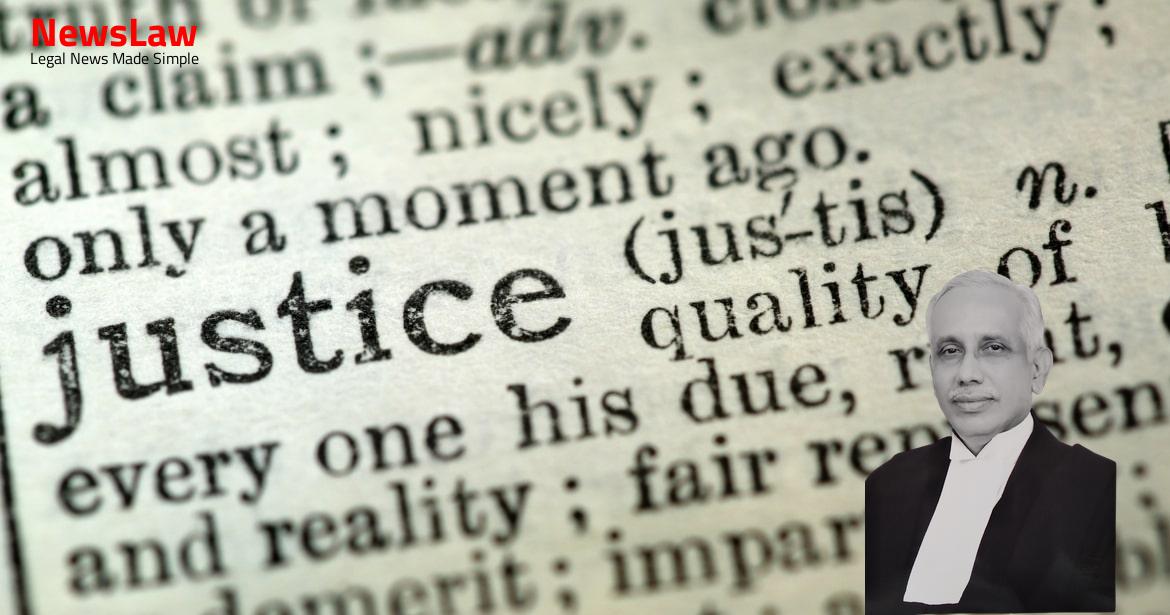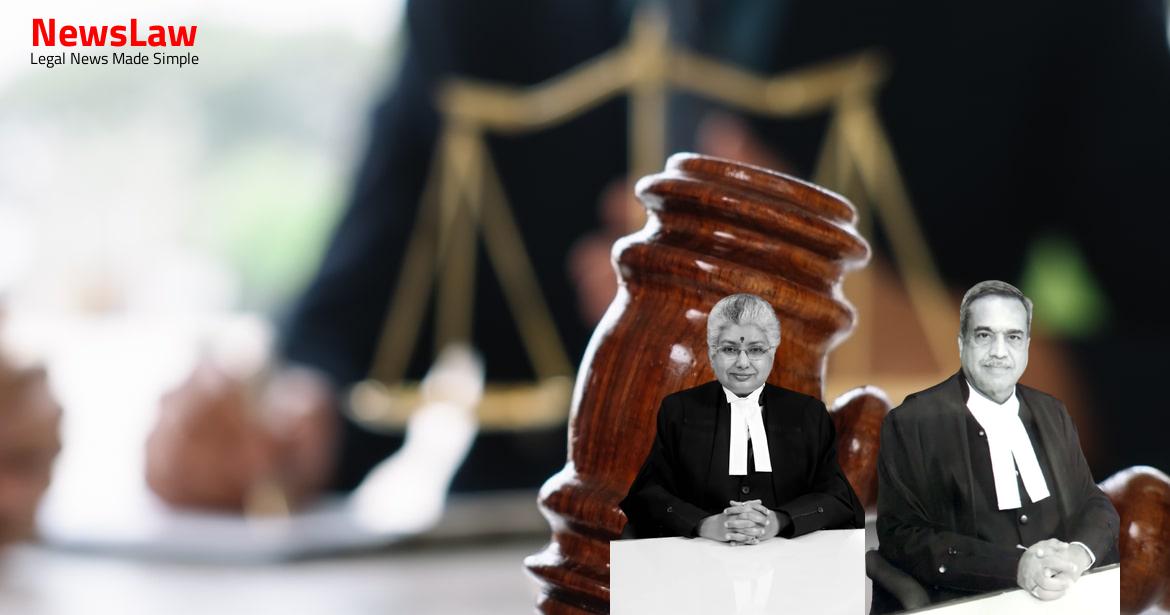In a landmark decision, the Supreme Court of India has overturned the judgments of the High Court and Trial Court in a case involving the appellant. The Court’s ruling highlights the importance of circumstantial evidence and the need for a thorough examination of all aspects of a case. Stay tuned for more updates on this case!
Facts
- Witness PW1 gave a statement that nobody saw Rumabai leaving the house with Shivcharan.
- One day before the incident, Shivcharan, Rumabai, and Ramesh were together at their house.
- The family searched for Shivcharan’s body but could not find it.
- Halke informed that the deceased’s body was found in a well 1 km away.
- An FIR was lodged by PW1 with similar allegations as his court statement.
- The witness did not read the FIR as the police took his signature without him knowing the content.
- The witness initially stated incorrectly that his mother and wife woke up when Rumabai was leaving the house.
- Rumabai did not give a satisfactory answer about Shivcharan’s whereabouts, raising suspicion.
- Rumabai later allegedly confessed that Ramesh killed Shivcharan and threw the body in a well.
- The witness admitted that the police did not perform any formalities in the village.
- The witness and his family members expressed hatred towards Rumabai.
- Rumabai was reported to have an illicit relationship with Ramesh from the same village.
- Chironji Jatav was the only one who saw Rumabai along with Shivcharan.
- Witness went back to sleep when Rumabai returned home alone.
- The family members were unable to locate Shivcharan after Rumabai’s return.
- Chironji Jatav asked Rumabai about Shivcharan’s whereabouts upon noticing her alone.
- The witness admitted that he and Shivcharan had been living separately for over six years.
- The witness mentioned that the FIR was not read out to him.
- High Court disbelieved recovery from Ramesh but believed recovery from Rumabai.
- Recoveries were an axe with bloodstains and shoes.
- High Court relied on the theory of last seen and a confession to convict the appellant.
- Trial Court convicted Rumabai and Ramesh for murder and destruction of evidence.
- Recoveries were allegedly made from Rumabai’s house and proven by a police officer.
- High Court acquitted Ramesh due to lack of evidence against him.
Also Read: Enforcement of Foreign Award: Case of Oscar Investments Limited and RHC Holding Private Limited
Analysis
- The law regarding circumstantial evidence states that all circumstances must form an unbroken chain leading to the guilt of the accused.
- The ‘last seen theory’ lacks independent witnesses, making it less conclusive.
- The recovery of a blood-stained axe from the house at the appellant’s instance is a crucial circumstance.
- The witness reveals objections to the accused’s illicit relationship with Ramesh, proving awareness among family members.
- Unnatural behavior is observed from the accused, casting doubt on her innocence.
- If the offense could have been committed by another person, the benefit of doubt should favor the accused.
- The assumption that the lady alone committed the murder lacks a solid motive as a basis.
- Husband-wife behavior in rural areas like going out together for defecation is considered normal.
- The alleged recovery of the axe is deemed false as the wife did not deny going out with her husband.
- It is uncommon for the accused to testify in such cases, indicating a unique situation.
- Motive analysis shows evidence contradicting the alleged illicit relationship as the motive.
- Last seen circumstance is supported by a witness who saw the accused and deceased together, strengthening this aspect of the case.
- The nature of the extra-judicial confession was that the co-accused, Ramesh, had killed the deceased.
- Since Ramesh has been acquitted, both the theories of illicit relationship and extra-judicial confession have to be discounted.
- Only the circumstance of last seen remains as evidence, but it alone is deemed insufficient to convict the accused.
- The sudden appearance of the axe at the house raises questions as no witness saw Rumabai carrying it.
Also Read: Case of Eligibility for Disability Pension: Air Force Officer’s Retirement
Decision
- The appellant is acquitted.
- The appeal is allowed.
- The judgment of the High Court and the Trial Court are set aside.
- Bail bonds stand discharged.
- The Trial Court mainly relied upon extra judicial confession.
Also Read: Judgment by Supreme Court On Man Singh vs. State of India
Case Title: MAHILA ROOMA BAI JATAV Vs. THE STATE OF MADHYA PRADESH HOME DEPARTMENT
Case Number: Crl.A. No.-001989-001989 / 2010



